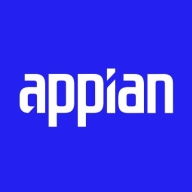

Appian and BIC Platform compete in the low-code business process management market. Appian seems to have the upper hand with robust app-building capabilities, offering a comprehensive development environment, while BIC Platform excels in specialized features for process documentation and modeling, focusing on improving process efficiency and compliance management.
Features: Appian's low-code development, process automation, and application integration are its most valuable features, offering rapid development and ease of use. BIC Platform shines in process mapping, compliance, and monitoring capabilities, making it a strong candidate for organizations focusing on detailed process documentation and regulatory adherence.
Room for Improvement: Appian could enhance its specialized documentation features to match the targeted process efficiencies offered by BIC Platform. It may also improve integration with advanced process mapping tools to match BIC's capabilities. BIC Platform could expand its app-building capabilities and improve its cloud deployment options to appeal to a wider audience, aligning better with Appian's comprehensive development strengths.
Ease of Deployment and Customer Service: Appian facilitates cloud-based deployment with strong customer support, including implementation assistance and continuous service options. BIC Platform offers flexible deployment options focused on tailoring solutions to organizational needs, backed by responsive support for process optimization, making it ideal for enterprises seeking detailed process control.
Pricing and ROI: Appian's higher setup costs are often justified by its comprehensive solutions and substantial ROI through enhanced process agility. BIC Platform typically offers a cost-effective initial setup, focusing on long-term process management efficiency, providing significant value through specialized process enhancements at a potentially lower price point.
| Product | Market Share (%) |
|---|---|
| Appian | 5.3% |
| BIC Platform | 1.4% |
| Other | 93.3% |

| Company Size | Count |
|---|---|
| Small Business | 20 |
| Midsize Enterprise | 9 |
| Large Enterprise | 41 |
Appian is a unified low-code platform and solution used by businesses to build enterprise applications and workflows. This product adapts to the needs of clients and the technologies they are already using to combine their data in a single workflow and maximize resources. The platform has four main components through which it transforms the work process for companies of various sizes. They are:
Appian is utilized across a diverse set of industries, including automotive and manufacturing, energy and utilities, education, financial services, telecom and media, transportation, retail, insurance, healthcare, and life sciences. The most frequent use cases of Appian are customer journey, governance, risk and compliance, operational efficiency, supply chain, distributed order management, and environmental, social, and governance (ESG) management.
Appian Features
Appian has various features that allow users to create solutions for their businesses. These features can be separated into a few groups according to function, including automation, low-code application development, and integrations and data. Some of the most frequently used features of Appian include:
Appian Benefits
The benefits of using Appian include:
Reviews from Real Users
A practice leader - digital process automation at a computer software company values Appian highly because the product is easy to develop, low-code, and has a good user interface.
Alan G., an advisory board member at Codecon VR, Appian offers a clear application life cycle, easy to learn documentation, and comes with a fundamentals course.
BIC Platform delivers all-encompassing business process management. The software covers the complete lifecycle of BPM and supports strategy, design, implementation, execution and controlling of business processes.
BIC Platform has a modular setup which allows individual adjustments. Typical deployment scenarios of BIC Platform are SAP introduction, governance, risk or compliance management, quality management or the structure of process management systems.
Thanks to its intuitive design, users quickly start with process modeling and manage the full process cycle up to the optimization. Comprehensive features of the software are document management, governance, review and release workflows.
Available BIC Platform modules are Design, Governance, Portal, Monitor, Workflow and GRC. The software can be operated either as a Public Cloud, Private Cloud or On Premises. Offline modelling is possible with the web-based option.
https://www.gbtec.com/bic-plat...
We monitor all Business Process Management (BPM) reviews to prevent fraudulent reviews and keep review quality high. We do not post reviews by company employees or direct competitors. We validate each review for authenticity via cross-reference with LinkedIn, and personal follow-up with the reviewer when necessary.